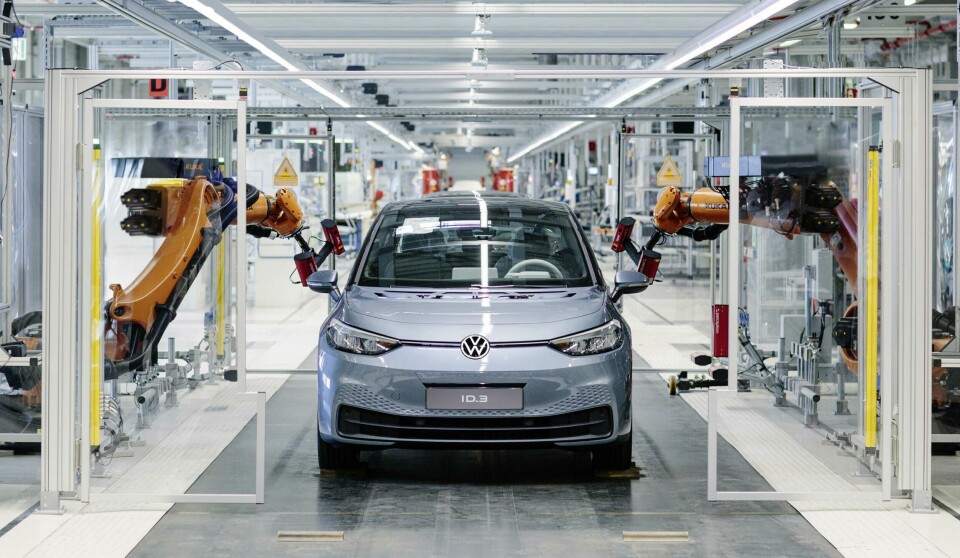VW Zwickau leads the MEB charge as ID.3 goes into production
Volkswagen’s vision for its newly-converted Zwickau plant is that it will become an emobility flagship – a state-of-the-art, flexible, high-tech factory with digitalisation underpinning all areas. Now series production of the ID.3 electric vehicle has begun at the factory in Saxony, VW’s new era is formally underway…

Series production of Volkswagen’s ID.3 has formally begun at the Zwickau vehicle plant. Company management were joined by German chancellor Angela Merkel for a special event at the factory to mark the arrival of VW’s entirely new generation of electric cars.
The ID.3 represents the launch of “the largest electric offensive in the automotive industry worldwide”, Volkswagen says, with 33 MEB-based models spread across the group’s brands due to enter production over the next three years. SOP comes after a comprehensive conversion of the Zwickau vehicle plant – Volkswagen is converting the entire facility from what was a 100% internal combustion engine vehicle plant into a factory entirely dedicated to electric vehicles.
The changeover began in 2018 and the full conversion will be achieved by the end of 2020.
Both the bodyshop and paintshop have already been prepared for ID.3 processes and with the first of two final assembly lines now ready, series production of the ID.3 is underway.
As part of the conversion, 12 buildings have been newly constructed or seen upgrade work. The existing press shop was extended, at a total investment of €75m, meaning from 2021, Zwickau will produce its own key body parts for the MEB toolkit on site.
From the final planned expansion stage in 2021, production capacity will rise from 300,000 to 330,000 vehicles per year. Volkswagen says this will make Zwickau Europe’s largest electric vehicle plant.
Around 8,000 employees are in place as the plant begins its electric era in earnest. So far, more than 2,500 employees have already been qualified for e-mobility, undergoing special high-voltage training, learning how to handle modern battery systems and electrical wiring safely and correctly.
The conversion has involved installation of more than 1,600 production robots, particularly in final assembly. New applications, such as the automated installation of the roof liner, mean than Zwickau is planning to produce about 150 cars per day more than before the transformation as a result of the expanded automation – 1,500 instead of 1,350.
A key challenge for VW was to transform the plant while maintaining existing production operations. In parallel to the development of ID.3 process, production of the Golf variant based at Zwickau will continue until mid-2020.
The first conversion works begin in summer 2018, characterised by what Volkswagen says was “the comprehensive modernization and refurbishment of the bodyshop, paintshop, assembly line and infrastructure.” In preparation for the MEB vehicles, an entirely new conveyor technology had to be prepared.
Emobility flagship
Volkswagen’s vision for its newly-converted Zwickau plant is that it will become an emobility flagship – a state-of-the-art, flexible, high-tech factory with digitalisation underpinning all areas. As with all modern plants, the bodyshop and painting were already highly automated. Focus now turns to the assembly halls and the degree of automation there is set for a boost.
The equipment supporting the assembly lines include around 1,700 of the latest-generation production robots along with more than 500 driverless transport systems for the autonomous delivery of parts to the lineside.
As well as tighter takt times, Volkswagen see automation bringing ergonomic benefits to tasks such as roof liner installations.
Volkswagen says the SOP for the ID.3 at Zwickau represents the start of a transformational period. In future, it will make electric cars at 8 MEB plants on three continents – in Europe, Asia and North America.
Zwickau is the just the first plant in a series that Volkswagen intends to converted. The factories at Emden and Hannover are next in line for the change over to the high-volume production of MEB-based electric cars. In China, two MEB plants are being built in Anting/Shanghai and Foshan ready for SOP in 2020. In North America, Volkswagen has invested US$800 million at its Chattanooga plant with a view to future production of electric cars.
All these facilities will benefit from the experience and know-how, Volkswagen says, of the team at Zwickau as it leads the charge.










